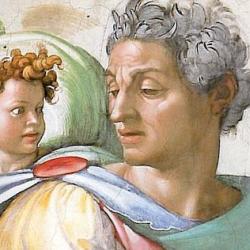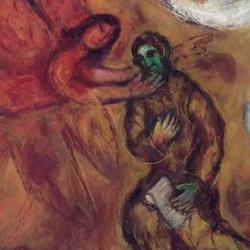Isaiah 57 begins with a chiastically arranged fragment of wisdom literature. Verse 1 begins and ends with “righteous one” ( tzaddiyq ):
A. The righteous man perishes
B. there is not a man there of heart
C. men of loyalty taken away
B’. there is not consideration
A’. for from the evil is taken away the righteous man.
What is it that people are supposed to “consider” and “take to heart”?
The fact that righteous and loyal perish and are removed might lead to questions like: Why should the righteous die? What lesson should we learn from the fact that the loyal are taken away? It should raise questions about the justice and fairness of the universe and the God who runs it.
For Isaiah, though, the death of the righteous leads to other conclusions. The righteous man is taken away, but what he’s taken away from is evil. Verse 2 describes the righteous dead as enjoying peace and resting. There’s a veiled allusion to Noah in the verb “rest” ( noach ), as well as a pun between that verb and the word “upright” ( nakoach ). The righteous man is like Noah, who walks uprightly and finds rest in the midst of a perverse and violent world.
Noah found his peace by being rescued alive from the evil. But Isaiah envisions Noahs who will find peace and rest by being removed in death. Isaiah has learned from Solomon: “The day of one’s death is better than the day of one’s birth” (Ecclesiastes 7:1). Death is an enemy, but it is not the only enemy, and sometimes God takes the righteous away to deliver them from worse evils.
For the wicked, Isaiah says, there is no peace or rest in death (57:21). They are simply taken away; they simply, dumbly, perish.










